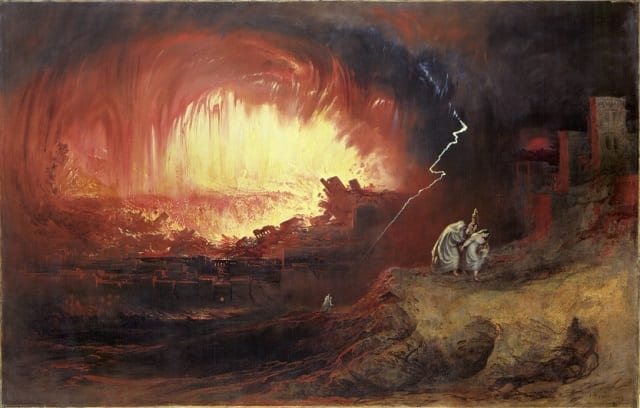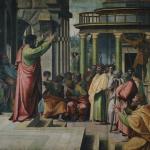
This is an “outtake” from my book, The One-Minute Apologist. I have expanded it, adding commentary on Jude 7.
*****
The Catholic Church is wrong to condemn homosexuality, because it is natural
No Church has any right to tell people what to do with their own bodies
The Bible clearly condemns homosexual acts as intrinsically, gravely sinful. Desperate attempts to explain away this prohibition are futile; the Bible is too clear.
For those who believe that the Bible is God’s inspired word, this issue is easily resolved. Catholics and other Christians didn’t make this rule; God did. But if one denies that the Bible is inspired, then, of course, none of the following proof texts will matter:
Leviticus 20:13 (RSV): If a man lies with a male as with a woman, both of them have committed an abomination; they shall be put to death, their blood is upon them. (cf. 18:22)
Judges 19:22-23: . . . behold, the men of the city, base fellows, beset the house round about, beating on the door; and they said to the old man, the master of the house, “Bring out the man who came into your house, that we may know him.” And the man, the master of the house, went out to them and said to them, “No, my brethren, do not act so wickedly; seeing that this man has come into my house, do not do this vile thing.” (emphasis added)
1 Kings 14:24: and there were also male cult prostitutes in the land. They did according to all the abominations of the nations which the LORD drove out before the people of Israel. (cf. 15:12; 22:46; Dt. 23:17; 2 Ki. 23:7)
Romans 1:24-27: Therefore God gave them up in the lusts of their hearts to impurity, to the dishonoring of their bodies among themselves, because they exchanged the truth about God for a lie and worshiped and served the creature rather than the Creator, who is blessed for ever! Amen. For this reason God gave them up to dishonorable passions. Their women exchanged natural relations for unnatural, and the men likewise gave up natural relations with women and were consumed with passion for one another, men committing shameless acts with men and receiving in their own persons the due penalty for their error.
1 Timothy 1:8-11: Now we know that the law is good, if any one uses it lawfully, understanding this, that the law is not laid down for the just but for the lawless and disobedient, for the ungodly and sinners, for the unholy and profane, for murderers of fathers and murderers of mothers, for manslayers, immoral persons, sodomites, kidnapers, liars, perjurers, and whatever else is contrary to sound doctrine, in accordance with the glorious gospel of the blessed God with which I have been entrusted. (emphasis added)
Jude 7: just as Sodom and Gomor’rah and the surrounding cities, which likewise acted immorally and indulged in unnatural lust, serve as an example by undergoing a punishment of eternal fire. (emphasis added; cf. Gen. 19:4-7 and 2 Pet. 2:4-10; the latter describes the behavior of the Sodomites as not merely violent rape but “licentiousness of the wicked” and “lust of defiling passion”)
Commentary on Jude 7:
A. T. Robertson, Word Pictures of the New Testament (Jude 1:7):
Having given themselves over to fornication(ekporneusasai). First aorist active participle feminine plural of ekporneuw, late and rare compound (perfective use of ek, outside the moral law), only here in N.T., but in LXX ( Genesis 38:24 ; Exodus 34:15 , etc.). Cf. aselgeian in verse Jude 1:4 . Strange flesh (sarko etera). Horrible licentiousness, not simply with women not their wives or in other nations, but even unnatural uses ( Romans 1:27 ) for which the very word “sodomy” is used ( Genesis 19:4-11 ).
Ralph Earle, Word Meanings in the New Testament (Grand Rapids, Michigan: Baker Book House, 1984):
[T]he noun porneia . . . includes all “sexual immorality” (NIV) or “gross immorality” (NASB). This is further enlarged here by the additional “going after strange flesh,” which rather obviously suggests homosexuality.
Navarre Commentary (Catholic):
The inhabitants of Sodom and Gomorrah were particularly depraved (cf. Gen 18:20ff): their sins — including unnatural vice (“sodomy”) — were proverbial (Jer 23:14; Ezek 16:48–50). The whole region was destroyed (cf. Gen 19:24–25) and its cities have always been cited as the classic example of the severity of God’s punishment of evildoers (cf. Jer 49:18; 50:40; Amos 4: 11).
Going after strange flesh – Margin: “other.” The reference seems to be to the unusual sin which, from the name Sodom, has been called “sodomy.” Compare Romans 1:27. The meaning of the phrase “going after” is, that they were greatly addicted to this vice. The word “strange, or other,” refers to that which is contrary to nature.
Jamieson-Fausset-Brown Bible Commentary:
going after strange flesh—departing from the course of nature, and going after that which is unnatural. In later times the most enlightened heathen nations indulged in the sin of Sodom without compunction or shame.
Strange flesh; margin, other flesh; he means male flesh, which is other than what God appointed for that use they made of it; or, as we render it, strange flesh, i.e. that which is strange, improper, and unfit for such an end. It is the description of the unnatural filthiness of the Sodomites, Genesis 19:5: see Romans 1:26,27.
given themselves over to fornication, and gone after strange flesh.The verbs are selected to bring out the intense sinfulness of the sin – the one being a strong compound form expressing unreserved surrender, the other an equally strong compound form denoting a departure from the law of nature in the impurities practiced. The sin has taken its name from the city with which the Book of Genesis so fearfully connects its indulgence. It forms one of the darkest strokes in the terrible picture which Paul has given us of the state of the ancient heathen world (Romans 1:27).
See also:
“What Does Jude 7 Mean By ‘Other Flesh’?” (Kevin DeYoung, The Gospel Coalition, 5-22-15)
“Homosexuality and ‘Strange Flesh’ “ (Dave Miller, Apologetics Press, 2004)
“EWTN Catholic Q&A: Jude 7 & homos sarx“ (Fr. John Echert, 6-11-03)
*
What is condemned in the Bible is selfish, abusive, forcible sex (of any kind), not homosexual acts, which are simply the result of the natural desire of some people. We know much more now about genes and psychology than they did in biblical times.
*
God doesn’t change. If He states that something is sinful and never permissible, then that prohibition applies at all times. Secondly, it isn’t true that the Bible only condemns homosexual rape and not such acts by mutual consent. All the passages above, excepting Judges 19:22-23 and 1 Timothy 1:8-11 condemn consensual homosexual acts. Jude 7 mentions “unnatural lust” and 2 Peter 2:4-10 states similarly.
Therefore, this objection collapses. As for the desire itself, Catholics don’t believe it is inherently sinful, as long as it isn’t acted upon (Catechism of the Catholic Church, #2358-2359), just as heterosexual lust, fornication, and adultery must be rejected in the will, by God’s grace, in order to avoid sin. Everyone has more than enough temptations to resist and overcome.
St. Paul in Romans 1 makes an explicit argument against homosexual sexual acts, as an unnatural practice; he also presents a similar argument in 1 Corinthians 6:12-20, by stating that excessive appetite for sex (and also food?) amounts to being “enslaved” (6:12). There is a created reality and natural order beyond mere physical pleasure, which must not be violated.
Certain things are wrong by their very nature. Sex outside of marriage — whether heterosexual or homosexual — belongs to that category (6:18-20). Again, he casually assumes that sodomy is intrinsically wrong in 1 Timothy 1:8-11.
C. S. Lewis (Anglican apologist):
The disciples were not told why (in terms of efficient cause) the man was born blind (Jn. 9:1-3): only the final cause, that the works of God should be made manifest in him. This suggests that in homosexuality, as in every other tribulation, those works can be made manifest: i.e. that every disability conceals a vocation, . . . The homosexual has to accept sexual abstinence just as the poor man has to forego otherwise lawful pleasures because he would be unjust to his wife and children if he took them. (in A Severe Mercy, by Sheldon Vanauken, New York: Harper & Row, 1977, Bantam Books edition, 1979, 146; letter of 14 May 1954; abbreviations removed)
Related Reading:
(9-17-06; expanded on 8-27-18)
Photo credit: The Destruction Of Sodom And Gomorrah (1852), by John Martin (1789-1854) [public domain / Wikimedia Commons]
***













